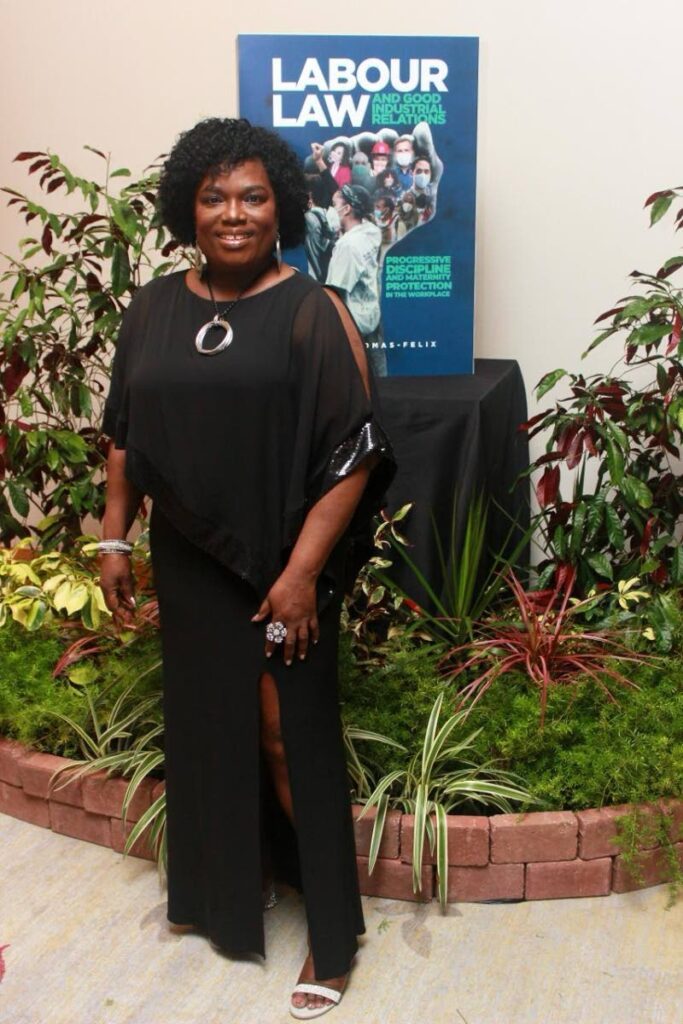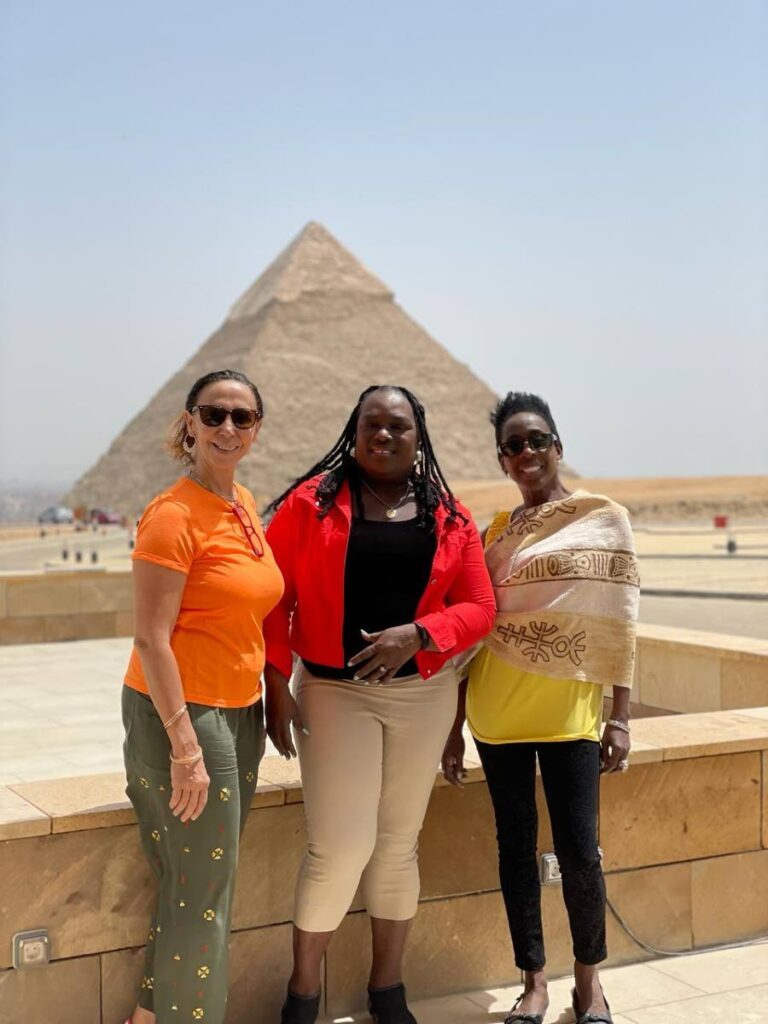Deborah Thomas-Felix always ready to serve

There have been a lot of professional "firsts" for Deborah Thomas-Felix, who continues to make her mark on the legal and managerial landscapes globally.
The former president of the Industrial Court was the first woman to be appointed to that position, which she held between 2011-2023. She did not comment on the non-renewal of her contract as the president of the Industrial Court.
Between 1990-2020, she broke the proverbial glass ceiling in the magistracy, Securities and Exchange Commission and at the United Nations Appeal Tribunal among other key appointments.
And that is just a fraction of what Thomas-Felix has accomplished as a legal professional.
She has co-authored Domestic and Gender-Based Violence and has written two books on labour law – Labour Law in the Commonwealth Caribbean: The Practice of Good Industrial Relations in the 21st Century and Labour Law and Good Industrial Relations: Progressive Discipline and Maternity Protection in the Workplace. She is currently writing her third labour law book – another contribution in her service to creating equity and justice in the workplace.
“In the course of my career, I never set out to intentionally achieve x or y, or to become this or that,” she told WMN in a Zoom interview.
“In a very real way, my career unfolded perhaps as a function of me being always prepared to embrace new opportunities. And as one chapter comes to an end, I view it as my contribution to this entity is completed and I'm ready to embrace the next chapter and the new opportunity. For there is always work to be done.”
She is certain, though, that politics will never be one of the opportunities she embraces. And its not that she hasn’t been asked to.
“It is not my cup of tea. In fact, I’m not even sure I understand it, although I did courses in history and political science while I was studying law.”
Thomas-Felix said the trajectory of her career has always embodied the power of inclusion, and she's glad she's had the opportunity to contribute to making it easier for the younger generations, especially women.

“Why? Because every additional crack in the glass ceiling means more light filters through. Of course, it hasn't been easy, for being the first in anything comes with its challenges…But it meant one more crack in the ceiling.”
She said when she became a magistrate, while gender was an inescapable issue, youth was another fundamental challenge.
“Most of the magistrates at that time were males in their 50s; there were only four women, including me.”
Her ability to rise to the occasion as a young woman demonstrates that young women can make valuable contributions to Trinidad and Tobago in whatever careers they choose once they remain focussed and true to themselves.
For many years Thomas-Felix's has been mentoring girls from her alma mater, St Francois Girls' College, Belmont. But her idea of being a mentor goes way beyond the traditional definition.
“I would talk to girls in form four who were interested in being lawyers. I'd take them from form four and beyond, and they become like my daughters. I’m there through the good and bad.
"When they have children, I'm there. When there is a death in the family, I'm there. If they buy a house I offer advice on decorating. I’m certified as an interior designer and I also did an extensive course in floral arrangements because I love flowers.”
But her mentorship is not limited to St Francois girls. Thomas-Felix said there are quite a number of boys who gravitate towards her for guidance.
“Maybe it’s because I have two sons. But the thing with mentorship for me is, once you are in my life, I will always be there.”
Reflecting on her advancement to the top of her field, she believes one of her key approaches, albeit unintentionally, was to forge allies with a cadre of women and men.

“I think to have allies in both men and women and of varying viewpoints provides much-needed professional support and guidance. "Some of these professional relationships morphed into some of the most rewarding friendships that transcended professional boundaries."
She believes men are also important partners in promoting gender equality and equity and are sometimes among the most significant allies in efforts to secure a more level playing field.
“I support the saying that ‘a rising tide lifts all boats.'"
Her experience as a mother while actively building a career, she said, brought its own set of unique challenges.
"I am always intrigued by the fact that it seems much more professional women are invariably asked about balancing careers and family than men. It would be useful for us to examine why this continues to persist because this would reveal the problematic assumptions underpinning this approach, given that men need work-life balance too."
And as with most women, her reliable support system during that time was invaluable and necessary for her success.
"But my children are now adults and I'm now a 'glamma' so the question of balance has receded far into the distance."
She has three grandaughters who are forbidden from calling her "grandma."
“They call me glamma or GG.
“I celebrate my 30th birthday every year with a party, and I will be 30 until I leave this life,”she said with a hearty chuckle.
A Fulbright scholar of the Hubert Humphrey Fellowship Programme, Thomas-Felix urges women to never allow race, gender or social status to define their potential for success.
“I have been in many meetings and institutions where I am the only one of my race,” and sometimes gender.
“Surround yourself with a supportive network of mentors and friends who can provide guidance, encouragement, and resources to help you pursue your goals.
And there are times, she said, when women will be required to challenge stereotypes and societal expectations.

“It is very important to take small but definite steps towards achieving your goals while, at the same time, ensuring that you have many different things in that basket of skills. So you may want to retool or reskill or learn something totally new.
“I think if a woman can overcome feelings of exclusion and pursue goals with confidence and determination, she can become the successful mother, sister wife, worker, friend, mentor, and an inspiration for other women.”
Thomas-Felix is humbled by all contributions she has made at the national, regional and international levels in her legal and management career. But there are a few that stand out. She recalled when she was at the TTSEC, one of the things she did was lobby very hard for TT to become a member of the International Organisation of Security Commissions (IOSCO).
“They were expanding the Board and I worked and lobbied and got them to agree that TT will become a member of the Board, and that was a huge achievement.
“We were the smallest ever country to do that, and in the world of finance that means a lot.”
But, she said, about two months before it came to fruition she was appointed president of the Industrial Court.
“What that meant was that I had to go to Washington at the US Security and Exchange Commission and inform them that I would no longer be there, but they gave the commitment that they would continue with the plan.”
Her work at the ILO, she said, has significant global impact.
“The ILO has 187 member states and sets the playing field, so to speak, for work throughout the entire world."
The committee comprises legal professionals with various specialities.
“I specialise in the Maritime Conventions and the Seafarers and Fishers Convention, as well as all the Occupational Safety and Health Conventions, and this year my expertise has been expanded to the Forced Labour Convention.”
She said during the covid19 pandemic, her expertise played a significant role in providing guidance on managing the workforce on ships at sea.
“During covid, the International Maritime Organisation reached out to the ILO for guidance on how to manage ships at sea…There were vessels with seafarers, doctors, on some ships there were dead people – nobody could come to shore…Countries were not allowing non-citizens, in many cases, to enter unto their shores...and you know people were entitled to their shore leave. It was chaotic.”
Thomas-Felix and two of her colleagues wrote a general observation as a guide for the entire maritime and fishing industry.
“And of course, I was the only English speaker, so I had to do the writing. Countries all over the world asked for it from 2020-2021. Then they wanted further directions, and we did a second one to enhance the first. This one was used from the end of 2021 into 2022… It helped stabalise the globe, and that work continues to be very useful.”

For Thomas-Felix travel is usually synonymous with work, be it in the Caribbean, Europe, North America, the Middle East or Africa.
But there are times when she travels for fun.
"My children live in Canada, so I go about three times a year,” and sometimes she would visit friends in Ghana, Egypt, Israel, and other exciting places.
But no matter what part of the world she is, the call to service remains a strong one.
“As Martin Luther King Jr once said, ‘Everyone can be great, because everyone can serve.’ And so, as always, I remain ready to be of service to my fellow citizens, to my country and to the world.”
Box
In 1990, then in her 20s, she became the youngest attorney in TT to be appointed a magistrate and became a senior magistrate within four years.
In 1995, she assisted the government of St Vincent and the Grenadines in structuring and establishing the Family Court of St Vincent and the Grenadines – the first to be established in the Organisation of Eastern Caribbean States, and of which she became president.
In 2001, after acting as chief magistrate, she became the first woman to ever hold the position of deputy chief magistrate in TT.
In 2009, Thomas-Felix was appointed the first female chairman of the TT Securities and Exchange Commission (TTSEC).
In December 2014, she became a judge of the United Nations Appeals Tribunal (UNAT) – the first Caribbean national be appointed to that position.
In November 2015, she became a member of the International Labour Organisation's (ILO) Committee of Experts on the Application of Conventions and Recommendations – a committee comprising 20 legal luminaries responsible for monitoring the application of international labour standards. She was the first TT national to become a member.
In 2016, she became president of UNAT and was the first Caribbean and black person to hold that position.
In 2017, she chaired the first high-level seminar on international administrative tribunal at the European Public Law Organisation in Attica, Greece.
In 2020, she was appointed a member of the International Monetary Fund Administrative Tribunal, an independent judicial forum for the resolution of employment disputes arising between the International Monetary Fund (IMF) and its staff members – again, the first Caribbean national and black person to be appointed to that position.

Comments
"Deborah Thomas-Felix always ready to serve"